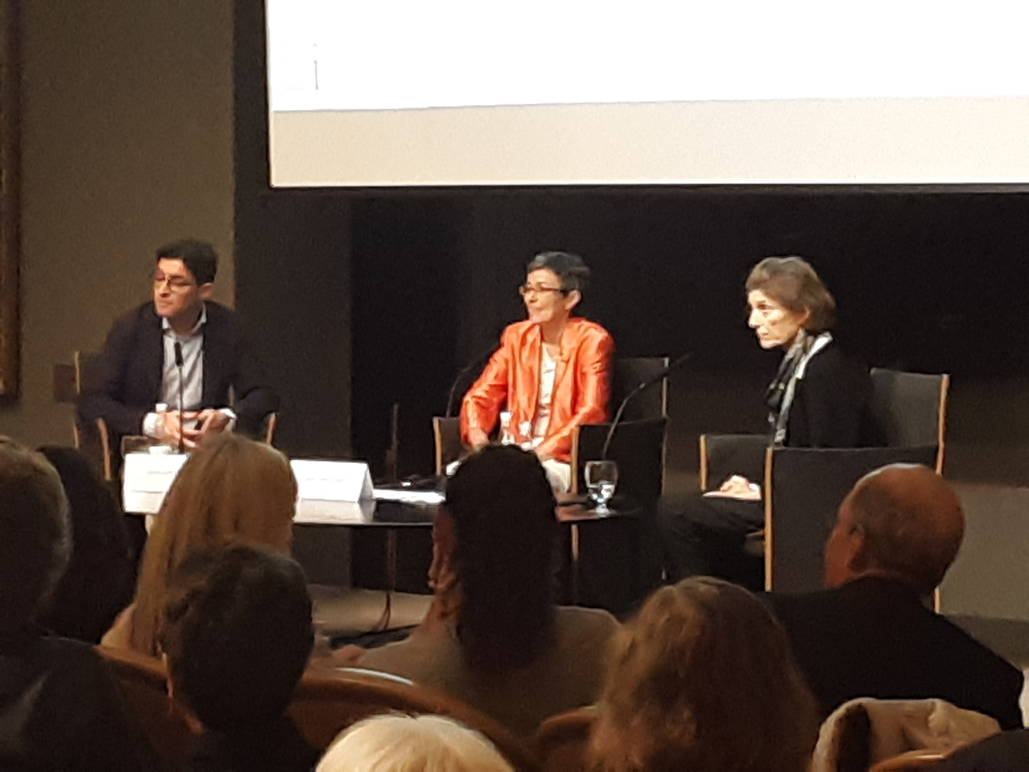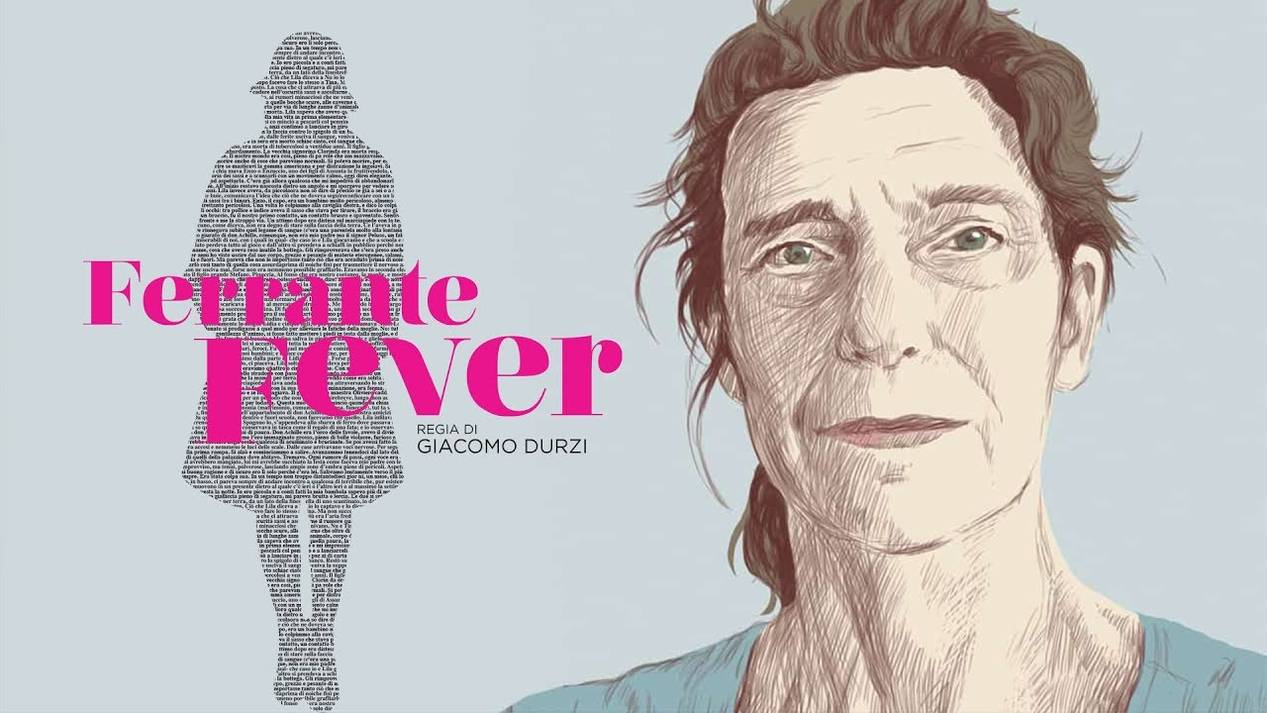“Ferrante Fever”: A Documentary on the Success of the Pseudonymous Author, Directed by Giacomo Durzi
Across Italy and the United States, a broad readership has devoured Elena Ferrante’s lengthy novels. More than five million copies have sold worldwide. The documentary “Ferrante Fever” was sparked by director Giacomo Durzi’s own passion for the novels. He also sought an opportunity to shift the focus away from uncovering the identity of the “faceless writer,” and toward the nature of the fever that spread rapidly from Italy to the rest of the world. The Institute of Italian Culture in Washington, DC held a special screening of the documentary for overflowing rooms at the Embassy of Italy on October 15, followed by a discussion with Durzi and Ann Goldstein, the American translator of Ferrante’s novels. Laura Benedetti, professor of Italian at Georgetown University, moderated the panel.
“I could not stop reading it or thinking about it… I’m rationing myself”. The opening lines of the documentary are spoken by a familiar voice, the first female candidate for president nominated by a major political party in the United States, Hillary Rodham Clinton. In the case of an unknown writer, Giacomo Durzi turns to other well-known witnesses of the experience that is reading a Ferrante novel.
Durzi begins in the United States because he wanted to “recreate a journey that goes back and forth, like her books, to capture the addiction that became so great and acquired by a huge number of people around the world,” he explained.
“She took your hand and dragged you into the story,” said Executive Director of the National Book Foundation, Lisa Lucas. “She wanted to show you something…” Ferrante digs to get at the heart and truth of emotion, and her books are “a gift to anyone who has ever felt they were crazy.”
Roberto Faenza, director of the movie adaption of “The Days of Abandonment”, believes that Ferrante “depicts the best of the female heart.” The role of women in society is center stage in her work, and the books have become a way for people across different generations, classes, and races to frame the conversation.
Interviewees in the documentary include prominent Italian writers like Roberto Saviano, author of “Gomorra”, who called Ferrante’s choice to remain anonymous “elegant,” and “art in its own right.” She doesn’t need to publicly represent her work because it does not deal with civic action or engagement, like his. In fact, his investigative reporting into the Camorra crime syndicate, and organized crime more generally, caused Saviano to receive numerous death threats. Now he must live under constant police protection. Saviano envies Ferrante’s ability to remain, as Laura Benedetti put it in the panel discussion following the screening, “under Harry Potter’s invisibility cloak.”
“The literary conversation in Italy was stale before Elena Ferrante,” Saviano argues.
In her letters, Ferrante writes: “I refuse to tell you who I am,” and “I believe that books, once written, have no need of their authors.” Although this has of course created curiosity, Durzi posits through his documentary it is not the reason she is a worldwide literary phenomenon.
Nicola Lagioia, another famous Italian writer and author of the Strega Prize winner “La ferocia”, or “The Ferocity”, wanted to interview Ferrante. He told the publisher he would not ask about her identity, and only focus on the literature, because it deserved to be talked about. Ferrante agreed, but shortly afterwards both authors were nominated for the Strega Prize, and she said “let’s wait for this Strega storm to pass.” Lagioia won the prize, he admitted, because “how would she receive it?” Elena Ferrante did not attend the award ceremony, and people wanted the winner to be a celebrity.
American novelist and author of the critically acclaimed “Amy and Isabelle”, Elizabeth Strout, was introduced to Elena Ferrante through a written interview, in which Ferrante said about concealing her identity: “I wrote the books, isn’t that enough?” Strout was hooked.
Every interviewee began with how quickly they read the books, and the grief they felt when they had finished. There was a sense of “well, what now?” at the turn of the last page.
No one felt this more strongly than Ann Goldstein, who has translated all of Ferrante’s works: “I feel like I was born to translate Elena Ferrante.”
Ann Goldstein has also translated works by Primo Levi, Pier Paolo Pasolini, and Italo Calvino, and is the editor of “The Complete Works of Primo Levi” in English. She has been the recipient of a Guggenheim fellowship and awards from the Italian Ministry of Foreign Affairs. Her translation of Ferrante’s “The Story of the Lost Child” was shortlisted for the Man Booker International Prize.
Goldstein became the representative face of Ferrante, but she shared during the panel discussion that she could not represent the author, only the books she has translated. Goldstein had no contact with the author, the publisher served as the liaison between the two. As a former editor and copyeditor for The New Yorker, she was actually “used to being invisible” to the reader.
“But if people need a person to attribute the books to, I will be that person, because [the Ferrante books] are good books and should be read,” Goldstein urged the audience. The conversation then turned to the arduous work of translating a novel into a different language, one with different connotations and meanings behind certain words, as well as its own idioms.
According to Goldstein, “translators should not be invisible,” and readers should know “there is someone else between you and the author,” making painstaking word and interpretation choices that could, if not done correctly, change the meaning or the emotional shading of the novel. There is also the danger of “domesticating” the text, or draining it of foreign themes and styles.
“Translation is a constant battle, a constant choice,” admitted Goldstein. It is often difficult to find words in English that will hold the same meaning as the Italian original. For example, the title “La figlia oscura” literally translated is “The obscure daughter”, but this doesn’t hold much meaning in English, “except a bad translation, which is not ideal,” Goldstein joked. She chose “The Lost Daughter” for the English version of the novel.
“L’amore molesto” was also a difficult title to translate, as molesting in English has such a specific meaning. “I try to find a balance between the meaning and requirements of the original,” she said in response to Benedetti, who questioned Goldstein’s choice of “Troubling Love” as a translation. This title doesn’t have the same disturbing shading as “molested,” but other words such as “bothersome” or “nasty” don’t fit either, underscoring Goldstein’s point about painstaking choices with each word. Benedetti did compliment the pace at which Goldstein produced the translations despite the challenging process, as the English editions were always released a year after the Italian editions.
“Elena made changes right up until the end, so I was translating in real time,” meaning Goldstein was reading the book for the first time as she translated. “Maybe there were things I would have done differently had I read all of them before translating, but I’m always making adjustments,” she admitted. It is part of the internal battle that comes with translating a foreign work.







































i-Italy
Facebook
Google+
This work may not be reproduced, in whole or in part, without prior written permission.
Questo lavoro non può essere riprodotto, in tutto o in parte, senza permesso scritto.